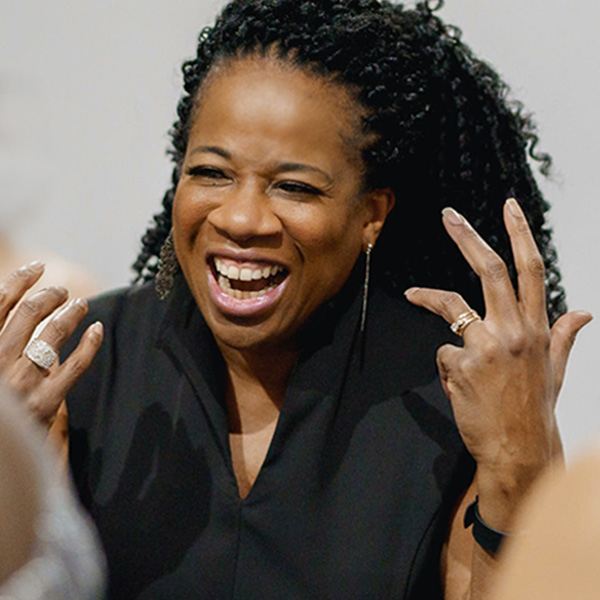Anuja Varghese, BA’05, had a very memorable 2023, earning two national literary awards for her critically acclaimed short story collection Chrysalis. Her triumphs had their roots in a very bad day she experienced in 2019.
Varghese, a fundraising manager for a national charity at the time, walked into work and was informed that her position had been eliminated.
“So, I had a little cry on the way home and in that moment, I also asked myself, ‘What now?’”
She says the answer came to her almost immediately. “I should write. It’s where I’ve always felt most like me. Being fired was the kick-in-the-butt moment that made me say that I’m going to just do it and I don’t know if I’ll get published [or] if I’ll write anything good.”
As the juries of two major literary prizes will agree, Varghese wrote short stories that were more than good; they deserved accolades thanks to “writing that is focused and vivid with characters that are unapologetic and feisty,” as one juror noted.
For Chrysalis, her debut book, Varghese won both the $10,000 Dayne Ogilvie Prize for LGBTQ2S+ Emerging Writers from the Writers’ Trust of Canada and the Governor General’s Literary Award for fiction, which came with a $25,000 prize.
Varghese, who lives in Hamilton, says her collection “includes elements of fantasy, fairytale, and horror. It focuses on the experiences of brown women and girls in moments of transformation, hence the title Chrysalis.”
In one story, identical twin sisters uncover the secret of a mysterious farmhouse on their family’s property. In another, a teenage misfit discovers a shape-shifting presence lurking at the borders of her suburban home. Throughout the collection are threads of speculative fiction, magical realism, and horror.
Those genres have long appealed to Varghese, since she was a teen in Kingston, Ontario, hungrily reading books by R.L Stine and Anne Rice. “I always liked the possibilities when you start playing with fantasy and fairytales. Anything can happen,” she says.
For her undergraduate studies, she chose English literature at McGill. “When I first went to visit and walked around the campus, I started to feel like that I belong here. Something about Montreal spoke to me,” she says.
She was enthralled by the books her professors exposed her to. “I got this wide-ranging survey of literature which I had never really looked into,” she says. “What I was reading growing up was mainly popular fiction. I had never really looked into the classics and had never been [immersed in] them until I went to McGill.”
Varghese’s McGill studies also helped pave the way for her subsequent career in arts administration and grant-writing. She had a Work Study position in the Department of English as an administrative assistant. She helped set up meetings and events, worked at Moyse Hall’s box office, and proofread theatrical programs – and realized that there was a lot going on behind the scenes at arts and cultural organizations.
“There [were careers] in arts administration, a field I didn’t even know existed as something concrete, and that gave me the chance to use my writing skills to take me towards that kind of practical career.”
Once she graduated, she moved to Toronto and began to secure positions in arts organizations working in administration, fundraising, and grant-writing.
After 2019, when she lost her job and moved to Hamilton to work at the YWCA, her interest in fiction writing led her to submit short stories to as many literary magazines as she could. “A friend told me that when you’re submitting stories, it’s a bit of a numbers game. So, send it out to 10 magazines, send it out to 20 magazines,” she says.
The acceptance letters began to roll in by 2020, with her work being featured in publications like The Malahat Review and The Fiddlehead.
As she accumulated short stories, she began to think about how to assemble them into a collection. “I really had to go through this process of convincing myself out of the idea of what a literary collection should look like,” Varghese says. “I was trying to force myself to write what I thought belonged in a literary short story collection, but those stories felt very forced, and they didn’t feel like me. So, I included other work that was more speculative stuff, the weird stuff, the ghost stories.”
When House of Anansi accepted her collection and published Chrysalis last year, she was excited to receive texts and emails from friends and family who were spotting her book on shelves from Victoria to Halifax. What was also fulfilling for her were the messages from those she didn’t know personally.
“Strangers said, ‘This is the first time I saw a queer brown person write about this. [Or] the way you’re writing about the kind of racism at work, well, that’s me.’”
Anuja Varghese
“Strangers said, ‘I had never heard of you, but I picked up your book … and this is the first time I saw a queer brown person write about this. [Or] the way you’re writing about the kind of racism at work, well, that’s me.’ This is why I wrote the collection.”
Winning two major literary prizes for Chrysalis has opened several doors for Varghese, such as a surge of invitations to speak at creative writing classes at universities across the country.
“I think the awards were important in terms of my collection being recognized for short stories, which don’t always get the same sort of love that novels do as a first book,” she says. “And as a book that centers on queer and racialized characters, if that’s going to help booksellers sell more of those kinds of books, if that’s going to encourage more readers to pick up those kinds of books, that’s really thrilling for me.”


